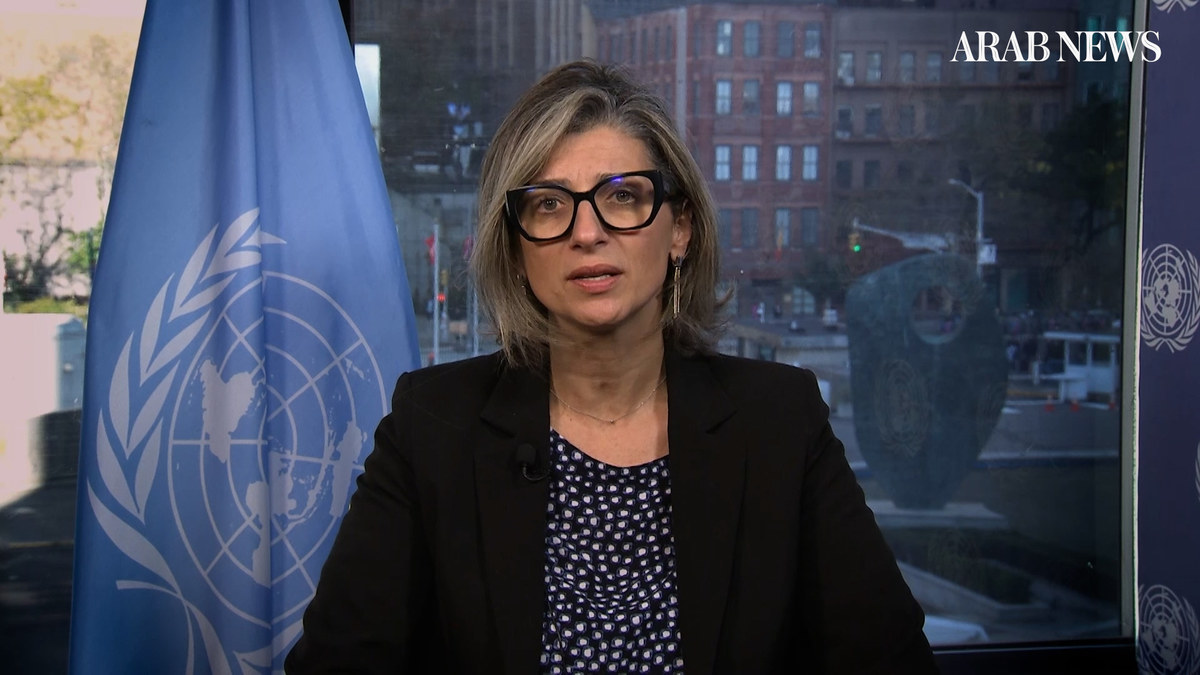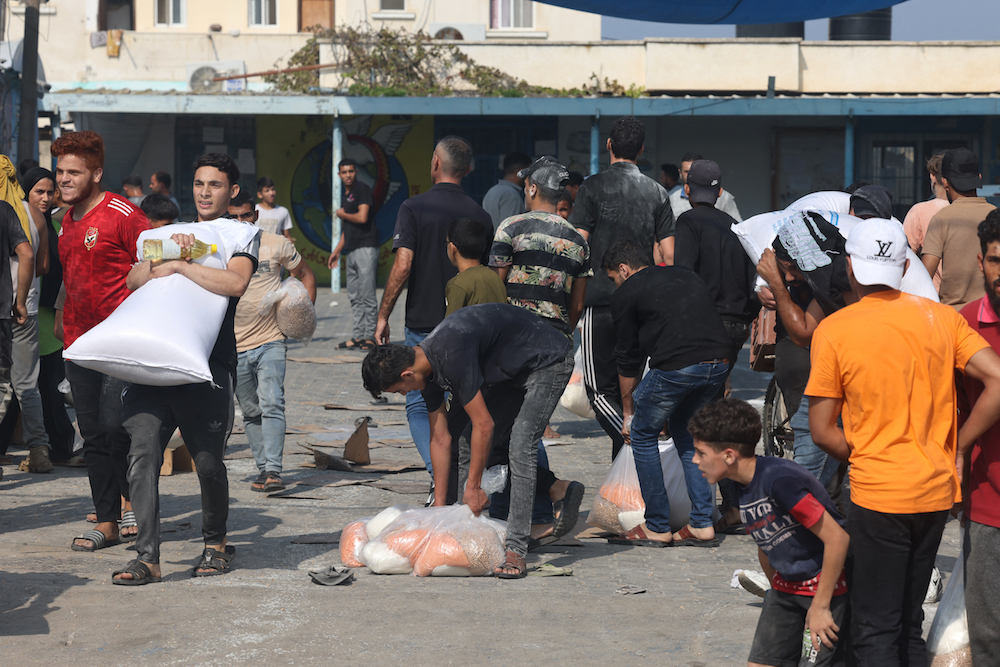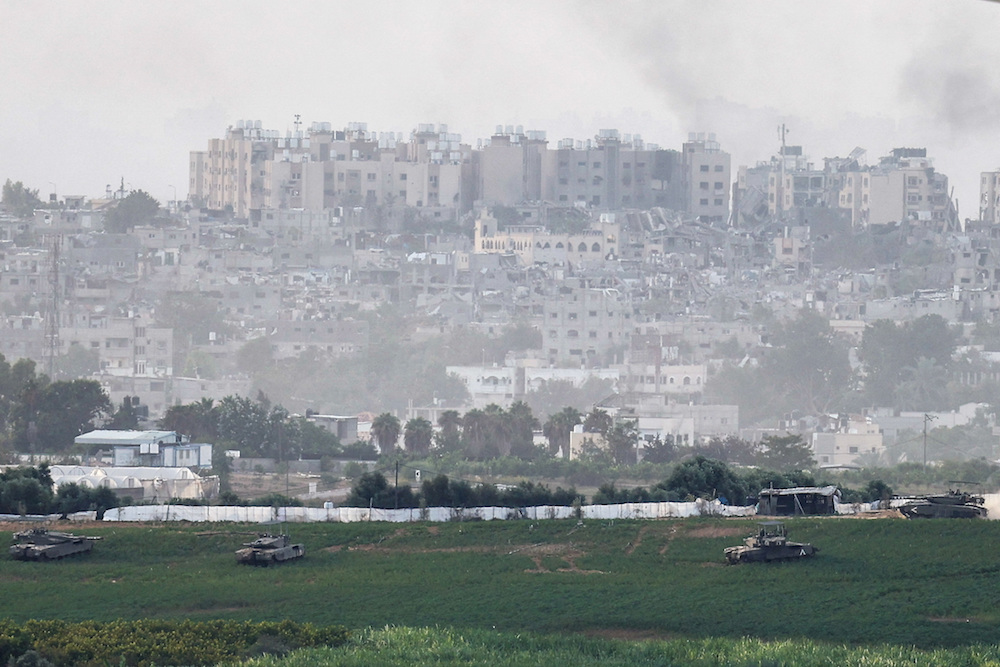DUBAI: Israel does not have the right to self-defense that it claims in the Gaza Strip owing to its status as an occupying power, according to the UN special rapporteur on the Occupied Palestinian Territories.
Francesca Albanese, who was appointed to the post in May 2022 for a three-year term, also believes that Israel’s military response to the multipronged attack by Hamas on Oct. 7 has gone beyond simply defending its own territory and its citizens.
“The right to self-defense that Israel has invoked under Article 51 of the UN Charter is quite clear. It entitles a state to repel an attack that comes from another state. So, the action necessary to repel the attack must be based on its intensity and scope. And it must be proportional,” she said on the Arab News current-affairs show “Frankly Speaking.”
Albanese added: “There is jurisprudence of the International Court of Justice that says that self-defense cannot apply in a context of military occupation when, in this case, Israel is occupying another state, another people.”
Explaining the context of a “proportional” response, she said that “in 24, 30 hours, Israel had regained control of its territory. So, as of then, the right of self-defense in its own territory — if self-defense is to be applied — was exhausted.”
She added: “Does it mean that Israel had to passively leave after what Hamas had inflicted? No, as I said, the protection of Israeli citizens had to be insured, and the military presence of Hamas had to be repelled. Which was done.”
As the fate of 2.3 million Palestinians remains uncertain amid intensifying Israeli military operations and a rapidly rising death toll, Albanese, an Italian academic and international human rights lawyer, spoke about the underlying dynamics of the conflict, whether anyone would be charged with war crimes being committed against civilians, and if the UN had once again failed the Palestinian people.

Francesca Albanese, UN special rapporteur on the situation of human rights in the Palestinian territories occupied since 1967, said Israel’s retaliation has been indiscriminate, destroying more than 42 percent of Gaza’s housing capacity, targeting civilian areas including hospitals, and killing thousands of Palestinians. (AN Photo)
The fighting erupted when Hamas launched rockets from Gaza into Israeli territory before infiltrating the border and killing both civilians and military personnel at several border towns, kibbutzim and a music festival on Oct. 7.
Hundreds of Israeli citizens and soldiers, as well as numerous people from multiple other countries, were also taken to Gaza and are being held as hostages.
After clearing its territory of Hamas militants, Israel began retaliatory operations in Gaza, formally declaring war on the armed group.
Albanese says the fact that Israel has been bombing the entire Gaza Strip without a stated military goal raises important questions. “A clear military aim could be dismantling Hamas’ military capacity. This could be one, but this has not been the language. This has not been the intent,” she said.
“The intent has been to eradicate Hamas as a whole. But Hamas is also a political entity. So, what does it mean in practice?
“Statements of Israeli politicians and leaders have declared that all Palestinians in Gaza are responsible for Hamas actions, so their backbone should be broken. The language used is extremely dangerous. Genocidal language has been used, and alarm has been raised by hundreds of scholars.”
Albanese said that the Israeli military campaign has been highly destructive and indiscriminate, destroying more than 42 percent of Gaza’s housing capacity and targeting civilian areas including hospitals, places of worship, and public markets.
Palestinian health authorities said that more than 8,000 people had been killed by Israel’s retaliatory airstrikes as of Sunday.
Asked whether the latest conflict in Gaza had changed her views, Albanese said the “only way to have a loud, clear, unchallengeable legal and moral voice right now is to condemn the attacks on civilians, whoever they are.

Palestinians collect bags of dried pulses from a UN-run aid supply center, distributing food to local Palestinians and people displaced following Israel’s call for more than 1 million residents in northern Gaza to move south for their safety, in Deir al-Balah, amid the ongoing battles between Israel and the Palestinian group Hamas. (AFP)
“What Hamas did on Oct. 7 goes beyond what legitimate resistance is, because the massacre of civilians is never justified, cannot be justified,” she told Katie Jensen, the host of “Frankly Speaking.”
Albanese continued: “Hamas is to blame for the brutal killing of civilians, because in a context of hostilities, while military targets are legitimate, and killing a soldier is a tragedy, killing a civilian is a war crime. Killing civilians is absolutely prohibited.”
On the other hand, she asserted that the Israel-Palestinian conflict did not begin on Oct. 7. “The occupation that Israel has maintained on the West Bank, including in Jerusalem and the Gaza Strip, is illegal for many reasons, including because it has translated into a default apartheid, into a vehicle to colonize Palestinian land, to forcibly displace people, to arbitrarily arrest and detain adults and children alike, to impose martial rule over millions of Palestinians, including blockaded Gaza,” she said.
“Gaza has been under an illegal blockade for 16 years, and during the 16 years, five wars had already taken place in Gaza — in 2008, in 2012, in 2014, in 2021, in 2022 — and these five wars had already caused the death of 4,200 people, including 1,100 children.”
Albanese’s opinions on Israel’s right to self-defense and actions in Gaza have stirred controversy; media outlets, NGO watchdogs and Israeli officials have accused her of antisemitism.
An Israeli minister demanded Albanese’s dismissal in April this year, writing a letter to the UN chief and the UN high commissioner for human rights to complain that she has been allowed to “continue to spew hatred, antisemitism, and incite violence.”
Albanese believes the efforts to remove her from her current position are a distraction from events happening in Gaza and in Palestine in general. “It’s nothing new. These kinds of attacks — ad hominem — have been used against anyone who has dared to criticize Israeli policies and practices vis-a-vis the Palestinians,” she said.
“So, I was not particularly surprised. Yes, they are very violent, but again, the louder the message, the louder the denunciation, the more violent the response.”
Arguing that the data that her detractors are attempting to deflect attention from is far more important than their accusations, she said: “Nothing that I’ve said in my three reports on self-determination and Israel violations — arbitrary, widespread and systematic arbitrary deprivation of liberty in the occupied Palestinian territories, the violations committed against Palestinian children — has ever been challenged. The substance of my factual and legal analysis remains valid, and this is why I urge the international community to consider this first and foremost.”

Appearing on Frankly Speaking, Francesca Albanese, the UN special rapporteur on the occupied Palestinian territories, said that Israel’s military response to the deadly October 7 assault by Hamas has gone way beyond simply defending its own territory and its citizens. (AN Photo)
With UN statistics saying that more than 1.6 million Palestinians have been forced to flee their homes as of Saturday, Albanese said it seems Gaza has reached the point of no return.
Multiple news outlets reported that in the wake of the evacuation order, airstrikes killed dozens of Palestinians attempting to flee Gaza City. Palestinians are unable to flee inside their own territory or to another country; Egypt, which borders Gaza, has not opened any corridors which would allow Palestinians to seek safety there.
“Israel has ordered the evacuation of 1.1 million people — so, half the population — from northern Gaza,” Albanese said.
“How can this even be considered legal when there are people in hospital, women and children, and elderly persons who cannot move? Because the south, where people have been ordered to move to, is being bombed. It has been bombed, and it’s destroyed. There is no capacity to accommodate these people.”
In other comments, Albanese condemned what she called attempts by the media to misinform or spread false information, something that has been common during the ongoing conflict.
“Every journalist should verify the information before disseminating it, but should also report all facts, all circumstances and try to inform. I’ve seen that there is a lot of bias,” she said.
One of the most contentious events in terms of media coverage was the explosion at Al-Ahli Arab Hospital in Gaza City on Oct. 17. Many details of the blast vary widely, and the entity behind the attack is a subject of fierce debate.
Multiple intelligence agencies claim that the explosion was caused by a misfired rocket from the Palestinian Islamic Jihad group, while the Hamas-run Gaza Ministry of Health claimed that an Israeli airstrike was responsible.

Israeli tanks manoeuvre inside the Gaza Strip, as seen from Israel, October 29, 2023. (Reuters)
“I’ve seen conflicting narratives, because in the beginning, there were many warnings from the Israeli military to the hospital to evacuate. The medical personnel responsible for the hospital communicated that they were not able to evacuate because there were seriously injured people and other patients,” Albanese said.
Immediately after the bombing, quickly-deleted social media posts suggested the Israeli military had hit the hospital because there were Hamas operatives inside.
Asked if those deletions raised suspicion in her mind, Albanese said: “There is a commission of inquiry which is investigating right now all the violence and all the crimes that have been committed since Oct. 7. And that’s the Commission of Inquiry appointed by the UN Human Rights Council in May 2021. I will wait for the results of their investigation.”
In light of the international community’s failure to force Israeli to agree to a ceasefire, many people say the UN has failed the Palestinian people yet again.
However, Albanese said the UN is failing both the Palestinian and the Israeli people “because all of them deserve peace and stability, which is the responsibility of the UN Security Council.
“What I see happening is a political and the humanitarian catastrophe of epic proportions,” she said.
On a final note, Albanese said allies of Israel should ask Prime Minister Benjamin Netanyahu what he meant when, in a televised address after the Oct. 7 Hamas assault, he said “what we will do to our enemies will reverberate for generations.”
Albanese said: “I fear for what it might mean, because on the one hand, you can eliminate all Hamas supporters and militants, but keeping the population under oppression, as Israel has done with the Palestinians for decades, would make another form of resistance re-emerge,” Albanese said.
“I am really scared that the situation can spill over an entire region, which is already critically affected. You are seeing streets and the squares of Arab cities full of people protesting. They protest because they think that the Palestinians deserve justice.”
Speaking for herself, Albanese said she had nothing but “a clear, people-centered approach” to her work.
“There is no one life that is more important than the other,” she said. “In the interest of both the Palestinians and the Israelis, the current hostilities must stop. A realistic international law-oriented solution has to be found now because tomorrow may be too late.”















